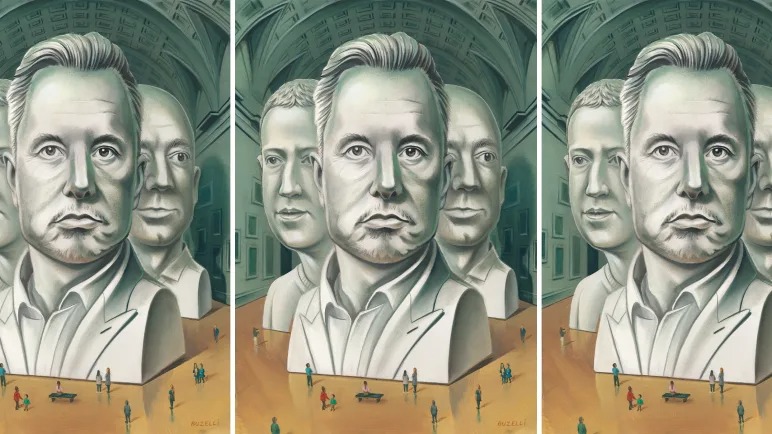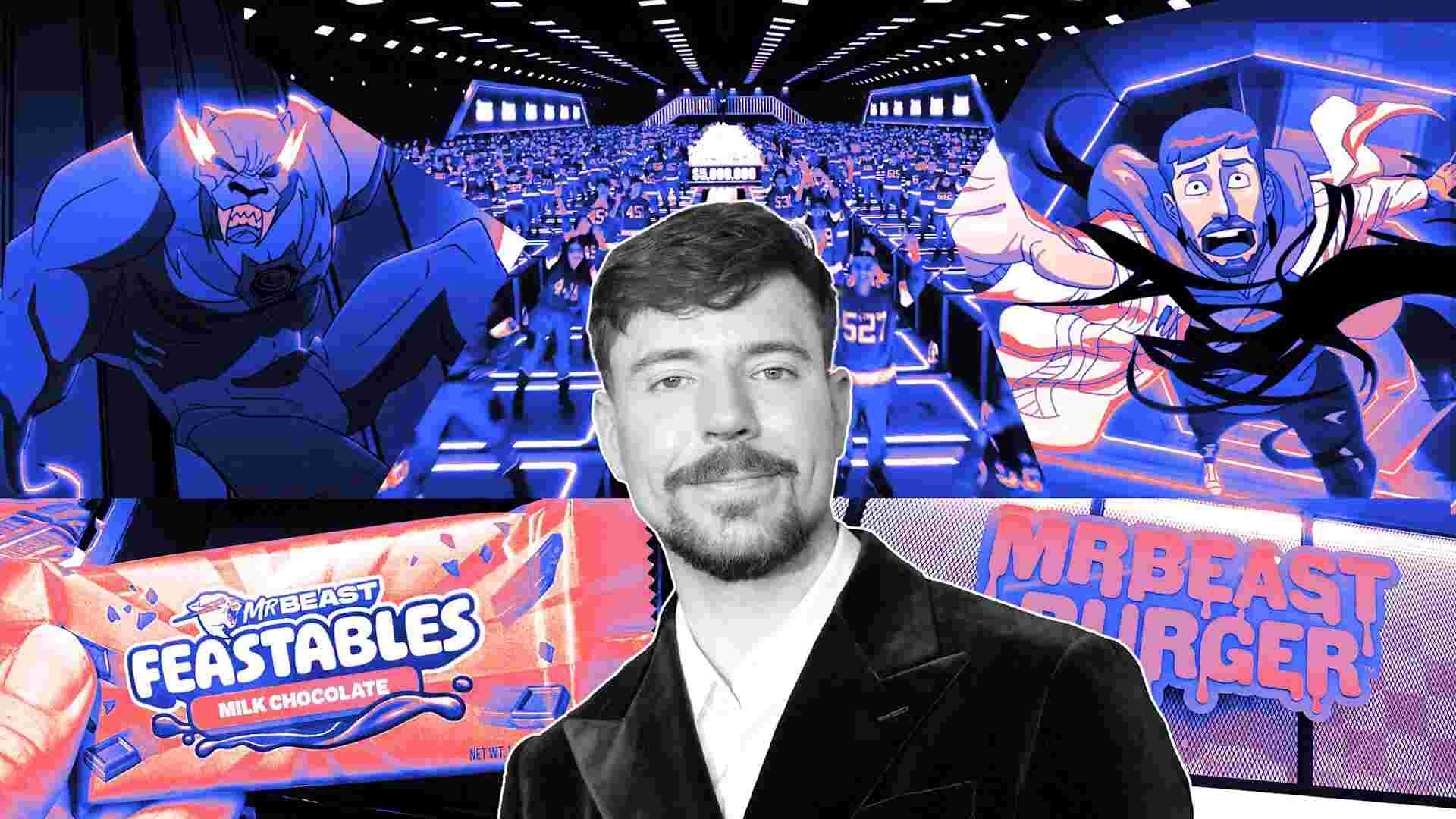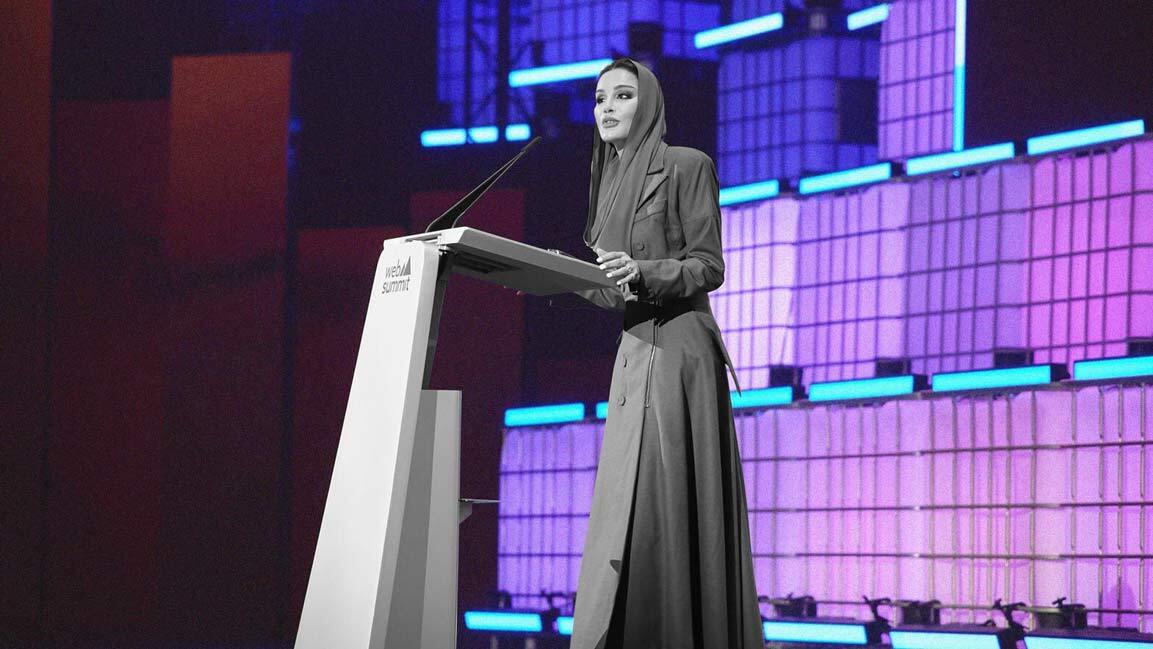- | 8:00 am
Tech bro podcasts are obsessed with alpha men, and it’s dangerous for the rest of us
From Lex Fridman to the ‘All-In’ besties, a new media category is emerging, and it’s enthralled with 21st century ‘Great Men.’

Jeff Bezos is a busy man. But in December, he found the time—two hours and 11 minutes, to be exact—to talk with Lex Fridman, a computer scientist and host of the Lex Fridman Podcast. Fridman’s podcast is the most popular in the technology category, according to Apple and Spotify. His following on social media—including his own Reddit community, 38,000 strong—extends to more than 8 million people.
During the past six years, Fridman has recorded more than 400 episodes on topics ranging from alien life to venture investing. His interview subjects have included OpenAI CEO Sam Altman, Coinbase CEO Brian Armstrong, aspiring Middle East dealmaker Jared Kushner, and entrepreneurial YouTube star MrBeast. In July, Fridman interviewed Benjamin Netanyahu, Israel’s prime minister, for an hour.
At first glance, Fridman might seem an unlikely influencer. His plodding baritone engages in only the most tentative banter. Episodes are a test of listener endurance, almost invariably running for more than an hour, if not two or three. And then there is Fridman’s monastic focus on his core interest: how to become a Great Man.
Yes, man: Not quite 12% of Fridman’s 400-plus guests have been women, and among those, the vast majority have been women scientists who observe the world as it is, unlike his typical guest—alpha-male builders who want to bend the world to their will.
“When you look up at the stars and think big, what do you hope is the future of humanity?” Fridman asked Bezos, after listening to the Amazon and Blue Origin founder share tales of childhood adventures on his grandfather’s ranch.
“I would love to see a trillion humans living in the solar system,” Bezos replied. “If we had a trillion humans, we would have, at any given time, a thousand Mozarts and a thousand Einsteins. Our solar system would be full of life and intelligence and energy.”
These days, Fridman and Bezos aren’t the only ones hoping for such a future. Fridman’s podcast is just one podcast in a wildly popular media category dedicated to elevating male business and tech leaders who are eager to be celebrated as modern-day frontiersmen striding boldly (and profitably) into the great unknown.
On YouTube, you can watch documentaries produced by Soylent cofounder turned nicotine entrepreneur John Coogan (400,000 subscribers), who hypes up leaders like Midjourney founder David Holz, Anduril founder Palmer Luckey, and Palantir cofounder Alex Karp. (Coogan is also an entrepreneur-in-residence at Palantir cofounder Peter Thiel’s Founders Fund.) On Substack, you can read paid-shill Packy McCormick’s newsletter Not Boring (220,0000 subscribers), which contains fawning company profiles. (McCormick describes his genre as “techno-optimistic media.”) And during your commute home, you can revel in the camaraderie of the All-In Podcast (485,000 YouTube subscribers, plus millions of followers on other platforms). Its ego-fueled, trash-talking installments have made unlikely stars of its four hosts, Silicon Valley insiders who rub shoulders with the likes of Elon Musk.

These content creators and tastemakers are united not just by their posture of admiration but by their Great Men worldview. Scottish historian and philosopher Thomas Carlyle is credited with having articulated this perspective (informally known as “patriarchy”) in a series of lectures he published in 1841: “The History of the world is but the Biography of great men,” Carlyle wrote. He did not consider Great Men to be perfect angels, but rather leaders who achieve great things in the face of great obstacles.
Carlyle’s favored Great Men squared off against adversaries such as British royalty (Oliver Cromwell), the Catholic Church (Martin Luther), and Hell (Dante). Today’s Great Men, as anointed by the podcast circuit, are almost invariably visionary business leaders who believe that imminent advances in AI, rocketry, and biotechnology will spur greater human flourishing. And they face their own set of epic adversaries: anti-tech media outlets, woke-ism, HR, and sometimes even one another (see Bezos’s Blue Origin versus Musk’s SpaceX, for starters).
There is a foundational assumption underpinning this theory and its media moment: that the best way to help humans is to cede greater power to a select group of already rich and powerful men. “Founder knows best” is the whisper between the lines, even if examples like Musk’s takeover of Twitter scream to the contrary. As usual, those who most stand to benefit from this narrative are the ones creating and amplifying it.
In early March, the cohosts of All-In had important news to discuss. In the weeks prior, Google had released its latest Gemini AI model, a rejoinder to OpenAI’s GPT-4. But instead of raves, the AI was inspiring ridicule. Programmed by its creators to preference diversity in ways that distorted historical accuracy, Gemini responded to prompts like “generate an image of a couple in 1820 Germany” with an illustration of an Asian woman and a Black man in a doe-eyed embrace.
“Google’s AI Is an Anti-White Lunatic” is how Mike Solana, the founder and editor-in-chief of tech-frontiersman-aligned publication Pirate Wires, headlined his dispatch on the debacle. Google parent Alphabet’s stock dropped nearly 5% following the launch, costing investors $90 billion.
On All-In, conversation among the self-described besties—successful tech executives who now write angel checks and fly private—centered around presumptive heroes Sergey Brin and Larry Page, Google’s founders, and the traitorous forces ostensibly undermining them, namely AI ethicists and Alphabet’s sprawling human resources department.
Cohost David Friedberg, who spent two years in corporate development at Google in the mid-2000s, compared the search giant’s fumbled AI launch to Meta’s ill-fated foray into the metaverse. In both cases, he suggested, founders with unmatched control over their companies had an opportunity—an obligation—to save the day. “Much like Google, [at Meta] there was an individual with super-voting shares who basically said, You know what, I am going to step in, and we’re going to make these changes and we’re going to fix this organization.” (What he didn’t say: that Mark Zuckerberg, the founder who saved the day at Meta, was the man behind the metaverse push in the first place.)
“It would require founder authority to come in there and make these changes,” added cohost Jason Calacanis. “It would require Larry and Sergey, who have the super-voting shares, to say, ‘This is all changing, enough of all this.’ ”
Calacanis had been an early investor in Uber who stood by polarizing founder Travis Kalanick until his last days as CEO. Calacanis and All-In cohost David Sacks advised Musk in his first weeks at Twitter. These Great Men–adjacent besties don’t just hail Silicon Valley’s conquering heroes—they join their war rooms and find ways to profit from their decisions.
Then there’s Substack writer McCormick, who started a venture fund that invests in the startups he endorses in his newsletters, proudly doubling down on his biases. Or venture capitalist Marc Andreessen, who published a viral 5,000-word “techno-optimist manifesto” last year that called for entrepreneurial boldness in the face of bureaucracy, corruption, and regulatory capture—a rallying cry that simultaneously furthered the interests of his investment portfolio. (That manifesto, by the way, lists the “patron saints” of techno optimism: 50 men and six women.)
The optimists love to imagine all the good things we could have if we lesser humans just got out of the way and let leaders pursue their grandest, wildest dreams: electric vehicles, longevity, Mars colonization, artificial general intelligence . . . the sky would be the limit. It’s a view that no Great Man seems to endorse as religiously as Musk.
Musk first sat down for an interview with Lex Fridman in 2019, when Fridman was working at MIT’s AgeLab and had just published a study on AI-assisted vehicles like Tesla’s and concluded that drivers remained engaged even when autonomous software took the wheel. Fridman’s study had not been peer-reviewed and soon attracted critics. (A former senior adviser at the National Highway Traffic Safety Administration called its methodology “deeply flawed.”) But Tesla, embroiled in controversy over the marketing and deployment of its Autopilot software, recognized the potential benefits of an MIT-affiliated endorsement of its approach. Less than a week after Fridman shared the study online, he was sitting down with Musk and recording the 18th episode of his then-fledgling podcast.
Before long, Fridman was landing guests like Microsoft CTO Kevin Scott and Facebook chief AI scientist Yann LeCun, and broadening his scope beyond technology to world leaders and Hollywood actors. Now, he seems to regard himself as a Great Man in his own right. In his introduction to his interview with Netanyahu, Fridman pledged to speak with “. . . people who have lived and suffered through the pain of war, destruction, and loss that stoke the fire of anger and hate in their hearts. For this, I will travel anywhere, no matter how dangerous.” The bold words were a stark contrast to his softball interview questions.
Last July, Fridman met with Musk outside his recording studio. They spent three hours practicing mixed martial arts, and Fridman posted photos on X of the two men flexing their stuff on a black mat. Describing the session as “impromptu” (Fridman wore jeans), he reported to his 3.4 million followers that he was “extremely impressed with [Musk’s] strength, power, and skill, on the feet and on the ground.”
Musk, of course, was preparing for a possible showdown with rival Zuckerberg, another convert to MMA. Musk’s taunting of the Meta CEO was mere saber-rattling—though Musk would soon face off in court against the Securities and Exchange Commission, the National Labor Relations Board, and the state of Delaware. And Fridman? What he seemed to be preparing for, if anything, was a chance to be in the ring with the men who matter.







































